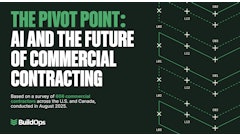
The schedule is a central source of information in construction, and multiple construction software vendors are creating artificial intelligence (AI) for contractors aimed at unlocking insights from or optimizing the schedule.
ALICE Technologies, for instance, creates an optimal schedule based on a set of constraints associated with the product.
“We have built a constraint modeling language or software and what you can do is model any type of constraint that you want,” ALICE CEO René Morkos said in our IRONPROS Product Deep Dive. “We have been doing this for several years, so it is rare to encounter constraints we can’t put in the system.”
SmartPM analyzes the schedule for predictive analytics, including, according to SmartPM CEO Michael Pink, schedule quality.
“A lot of people think schedule quality is about whether the durations correct no most of the time. And no, the durations are not correct because they could either be shorter or longer or somewhere in the middle,” Pink said in a recent IRONPROS video interview. “That's a fluctuating thing whereas these scheduling programs allow a static duration. But schedule quality to me is following best practices to build a schedule that's functional—something that's going to work. Something that's incorporated any and all sorts of logic and relationships amongst all the activities such that what you get out of this program that critical and near-critical paths is accurate and trustable.”
Slate Decision Assistant
October 25, Slate Technologies announced the latest release of Slate Decision Assistant, a generative AI construction decision support tool. Slate Decision Assistant leverages both generative and predictive AI, harnessing what the company says is the first “proprietary Large Language Model (LLM) specific to the construction industry.”
A release said customers were already using the software to streamline workflows, create process innovation and reimagine projects, creating return on investment (ROI) through increased productivity, hours saved, takeoff and estimating speed and project health management.
Announced features include:
- Cross-platform intelligence to connect with and analyzes data from a wide range of software platforms
- Contextual data analytics to create insights into how data points impact project schedules and budgets
- Slate's Proprietary Large Language Model (LLM) with its construction-specific vocabulary to enable intelligent interactions
- Data Visualizations for data-driven decisions
- AI recommendation models that learn from user interactions and project outcomes that in turn drive contextual recommendations that improve over time thanks to machine learning
In an October call with IRONPROS, Slate Technologies CEO Trevor Schick laid out the value proposition for Slate Decision Assistant.
“One customer in particular is using it today that on a daily basis,” Schick said. “We've brought in their data, we've connected their checklists, their RFIs, to their schedules. And then we have a part of Slate that's called visualize that takes the BIM 360 model and pulls it in. But then you pull up the floor of that building, and it will show whatever you’ve spotted in that building and if you currently have something that might impact schedule or cost.”
This insight is then used within the contractor organization for decision support, but also collaboratively with subcontractors.
“They use that tool when they sit down with the trades,” Schick said. “They'll look at it and say, 'Okay, we have an open RFI, that could be an impending five-day slip. What are we doing about it? How do we resolve that?' … What we can do is give you a way to get the most important things in that data in front of you—and then if you want to dig into it through conversational AI.”
Another early application for Slate Decision Assistant is subcontractor selection or bid invitation based on historical experience, an area where humans are surprisingly subject to biases according to Schick.
“So think about when you're doing your pre-con meeting,” Schick said. “You bring in your initial schedule, and someone says that electrical subcontractor was 40 days late last time, and you only have 20 days of buffer in your schedule. You need to find a different subcontractor. And if we're connected to your vendor list, we can recommend that you should increase your buffer based on what that subcontractor has done in the past. We’re trying to give the right information back to people, both based on learnings of the past plus this being able to use kind of industry best practices and the early days to give them feedback so that they can be more successful in their project.”
But sometimes Schick said the AI has proven less subject to recency bias, for instance, because it can also consider the subcontractor’s total historical record rather than just the last anecdote.
READ OUR FULL ANALYSIS OF SLATE DECISION ASSISTANT ON IRONPROS.




















